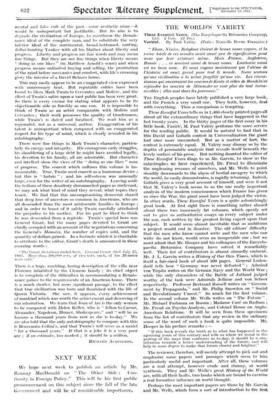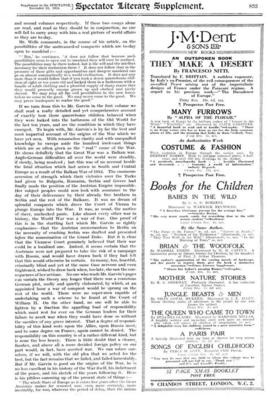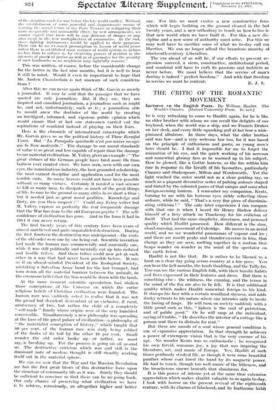THE WORLD'S VARIETY
Varldtd. By Paul Valery. (Paris : Nouvelle Revue Francaise.) " Elam, Ninive, Babylone itaient de beaux noms ragues, et la mine totale de ces mondes avail aussi peu de signification pour nous que leer existence mime. Mais France, Angleterre, Russie . . . ce seraient aussi de beaux noms. Lusitania aussi est un beau nom. El nous royons maintenant que l'abi-me de l'histoire est asset grand pour tout le monde. Nons' sextons qu'une civilisation a la nutine fragilite qu'une vie. Les circon- stances qui enverraient les, oeuvres de Keats et edges de Baudelaire rejoindre les oeuvres de Minander ne sont plus du tout incon- cerables ; elks sont dans les journaux."
THE English peoples have lately published a very large book, and the French a very small one. They both, however, deal with everything. Thus a comparison is tempting.
These Eventful Years tells us in 1,400 closely printed pages all about all the extraordinary things that have happened in the last twenty years. In the thirty pages of the first-essay in his little book, Variad, M. Paul Valery performs the same service for the reading public. It would be natural to find that in this David and Goliath contest in Universalization the giant had once more succumbed. But as a matter of faet, the contest is extremely equal. M. Valery may dismay us by the depths of pessimistic analysis that reveals itself beneath the lovely surface of his prose. But nothing daunted the editor of These Eventful Years flings to us Mr. Garvin, to show us the catastrophes we have experienced, Dr. Freud to illuminate
the unpleasing recesses of ourselves, and Mr. Wells to point steadily downwards to the abyss of bestial savagery to which the world, he easily demonstrates, is rapidly returning. Indeed, Goliath gives a very good account of himself, and were it not that M. Valery's book seems to us the one really important analysis of the modern consciousness which France has given us since the War, the giant must have been judged the victor.
In other words, These Eventful Years is a quite astonishingly good book. At first sight there is something rather absurd about these two immensely fat volumes, which openly set out to give us authoritative essays on every subject under the sun, each written by the greatest living expert upon that subject. It would seem almost inevitable that so ambitious a project would end in disaster. The old editors' difficulty that the men who know cannot write and the men who can write do not know, would seem an insuperable one ; but we must admit that Mr. Hooper and his colleagues of the Encyclo- paedia Britannica Company have solved it remarkably well. Their list of contributors is almost absurdly eminent. Mr. J. L. Garvin writes a History of Our Own Times, which is itself a fair-sized book of about 200 pages. General Luden- dorff tells how " Germany was never defeated " ; Admiral von Tirpitz writes on the German Navy and the World War ; while the only chroniclers of the Battle of Jutland judged worthy of the task were Admirals Jellicoe and von Scheer respectively. Professor Bertrand Russell writes on " Govern- ment by Propaganda," and Mr. Philip Snowden on " Social and Revolutionary Unrest." So much for- the first volume. In the second volume Mr. Wells writes on " The Future " Mr. Michael Farbman on Russia ; Madame Cure on Radium ; Dr. Freud on Psycho-Analysis, and Colonel House on Anglo- , American Relations. It will be seen from these specimens. from the list of contributors that any review in the ordinary, sense of the word of such a book is quite impossible. Mr. Hooper in his preface remarks :— " If this book reveals the truth as to what has happened in the agonising years of this century and tells us where we stand in the parting of the ways that confronts us to-day, it should be a con- tribution towards a better understanding of the future, and will help in some degree to make that future clearer and brighter."
The reviewer, therefore, will merely attempt to pick out and emphasize some papers and passages which seem to him particularly useful and important. After all, these volumes are a real attempt, however crude and clumsy, at world
synthesis. They and Mr. Wells's great History of the World are, with all their faults, two books which are bound to exercise
a real formative influence on world thought.
Perhaps the most important papers are those by Mr. Garvin and Mr. Wells, which form a sort of introduction to the first, and second volumes respectively. If these two essays alone are read, and read as they should be in conjunction, no one
will fail to carry away with him a real picture of world affairs as they are to-day.
Mr. Wells comments, in the course of his article, on the possibilities of the undreamed-of conquests which are to-day open to mankind :—
" ' But,' he continues, ' it does not follow that because such possibilities seem to open out to mankind they will ever be realized. The possibilities may be there indeed, but is the will and the intellect necessary for their realisation there ? It does not follow that in the presence of these gifts and opportunities and dangers mankind can go on almost automatically to a world civilisation. It does not any more than it would follow that if you took a dozen quarrelsome chil- dren of eight or ten years old and locked them in a bathroom with a bundle of adult clothing and a plentiful supply of sharp razors that they would presently emerge grown up and clothed and nicely shaved. We may reap all the evil possibilities in the new forces before we come to the good. We may never come to the good. We may prove inadequate to realise the good."
If we turn from this to Mr. Garvin in the first volume we shall read a really detailed and yet comprehensive aecount of exactly how those quarrelsome children behaved when they were locked into the bathroom of the Old World for the last ten years, and see the condition in which they have emerged. To begin with, Mr. Garvin's is by far the best and most impartial account of the origins of the War which we have yet seen. With remorseless clarity and with unequalled knowledge he sweeps aside the hundred irrelevant things which are so often given as the " real " cause of the War. He shows definitely that the Great War was a Balkan war. Anglo-German difficulties all over the world were steadily, if slowly, being resolved ; but this was of no account beside the fatal situation which had arisen in South and Central Europe as a result of the Balkan War of 1912. The enormous accession of strength which their victories over the Turks had given to Bulgaria, Rumania, Serbia and Greece had finally made the position of the Austrian Empire impossible.
Her subject peoples could now look with assurance to the day of their deliverance by their already. free brothers in Serbia and the rest of the Balkans. It was no dream of splendid conquests which drove the Court of Vienna to plunge Europe into the War. It was, as usual, the motive of sheer, unchecked panic. Like almost every other war in history, the World War was a war of fear. One proof of this is in the startling fact which Mr. Garvin so rightly emphasizes—that the Austrian memorandum to Berlin on the necessity of crushing Serbia was drafted and presented before the assassination of the Grand Duke. But it is clear that the Viennese Court genuinely believed that their war
could be a localized one. Indeed, it seems certain that the Austrians were not prepared to take the risk of a campaign with Russia, and would have drawn back if they had felt that this would otherwise be certain. Germany, too, boastful, criminally blind and yet at the same time nervous and even frightened, wished to draw back when, too late, she saw the con- sequences of her actions. No one who reads Mr. Garvin's pages
can sustain the theory any longer that there was a conscious German plot, coolly and quietly elaborated, by which, at an appointed hour a war of conquest would be sprung on the rest of the world. There were no super-men capable of undertaking such a scheme to be found at the Court of William II. On the other hand, no one will be able to lighten by a fraction the appalling load of responsibility which must rest for ever on the German leaders for their failure to avert war when they could have done so without the sacrifice of any grave interest. That a degree of responsi-
bility of this kind rests upon the Allies, upon Russia most, and to some degree on France, again cannot be denied. The responsibility on this country is of a rather different kind, but is none the less heavy. There is little doubt that a clearer, franker, and above all a more decided foreign policy on our part would, in fact, have averted war. We can solace our- selves, if we will, with the old plea that we acted for the best, but the fact remains that we failed, and failed lamentably. But if Mr. Garvin is good on the origins of the War, he is no less excellent in his history of the War itself, his indictment of the peace, and his sketch of the years following it. Here is his pitiless summing up of the present state of things :-
" The whole State of Europe as it exists five years after the Great Armistice makes for renewed war, even more certainly, more inevitably, for war, whatever the period of delay, than the nature of the situation made for war before the late world conflict. Without. the eistablishment of some powerful and dispassionate means of revising tin actual t...rins of the Paris Treaties or mitigating their more inequitable and unbearable effects by new arrangements, we cannot expect that there will be any decrease of danger or any abatement in the new multiplication of armaments. In the end, these fighting-. instruments would be applied to their purposes. There can be no r.o.isoned presumption in favour of world peace unless there is established some manner of world system to induce no less than to enforce it, by exercising powers of revision in the interests of practi.ial justice as well as of guarantee for the security of such landmarks as no neighbour may rightfully remove."
This was written, of course, before the considerable change for the better in the last nine months, but it is well to bear it still in mind. Would it even be impertinent to hope that Mr. Austen Chamberlain is not unaware of such considera- tions ?
After this we can never again think of Mr. Garvin as merely a journalist. It may be said that the passages that 'we have quoted are only journalism. But if they are, they are inspired and ennobled journalism, a journalism such as might be, and not, unfortunately, such as is ; a journalism able to mould anew the destinies of the world by creating an intelligent, informed, and vigorous public opinion which would ensure that at last our statesmen carried out the aspirations of mankind instead of playing on their fears.
Here is the chronicle of international catastrophe which Mr. Garvin gives us as the political history of These Eventful Years. But " La Persepolis spirituelle n' est pas moires ravager que la Suse materielle." The damage to our moral standards of value is as great and less capable of repair than the damage to our material civilization. M. Valery gives an example : " The great virtues of the German people have bred more ills than laziness ever created vices. We have seen, seen with our own eyes, the conscientious industry, the best grounded scholarship, the most earnest discipline and application used for the most terrible ends. So many horrors could not have been possible without so many virtues. Certainly it needed a vast science to kill so many men, to dissipate so much of the good things of life, to raze to the ground so many cities in so short a time ; but it needed just as great moral qualities. Knowledge and Duty, are you then suspect ? " Could any living writer but M. Valery express so perfectly the real irreparable damage that the War has done to the old European psyche ? The self- confidence of civilization has gone. And in the form it had in 1914 it can never return.
The first twenty years of this century have been years of almost unrelieved and quite unparalleled destruction. During the first fourteen the destruction was underground—the roots of the old order were one by one being cut. Scientific invention had made the human race commercially and materially one, while it was still politically and mentally cut up into isolated and hostile tribes. And these tribes could now get at each other in a way that had never been possible before. It was as if an absent-minded President of the Zoological Society, mistaking a Salvation Army band for the last trumpet, had torn down all the material barriers between the animals, in the erroneous belief that the lion would lie down with the lamb.
At the same moment scientific speculation had shaken those conceptions of the Universe on which the entire religious beliefs of Christian civilization were founded. The human race was suddenly asked to realise that it was not the. proud but decadent descendant of an exclusive, if rural, aristocracy of two, but rather the child of a completely " self-made " family whose origins were of the very humblest conceivable. Simultaneously a new philosophy was spreading at the base of the great palace of civilization—a philosophy of " the materialist conception of history," which taught that 90 per cent. of the human race was daily being robbed of the fruits of its toil by the other 10 per cent. Small wonder the old order broke up—or rather, we must say, is breaking up. For the process is going on all around us. The destructive criticism which was and still is the dominant note of modern thought is still steadily working itself out in the material sphere.
We can see now that the War and the Russian Revolution are but the first great blows of this destructive force upon the structure of community life as it was. Surely they should be sufficient to convince us that there can be no going back. Our only chance of preserving what civilization we have is to achieve, consciously, an altogether higher and better one. For this we must evolve a new constructive fora which will begin building on the ground cleared in the las' twenty years, and a new orthodoxy to teach us how to live in that new world-when we have built it. For this a new dis- cipline and a new sense of authority must arise. For this we may well have to sacrifice some of what we to-day call our liberties. We can no longer afford the luxurions anarchy of nineteenth-century Liberalism.
The era ahead of us will be, if our efforts to prevent re- gression succeed, a stern, constructive, architectural period, and mankind will have to curb its passions and instincts as never before. We must believe that the service of man's destiny is indeed " perfect freedom." And with that freedom in service we must be content. E. J. S.




























































 Previous page
Previous page